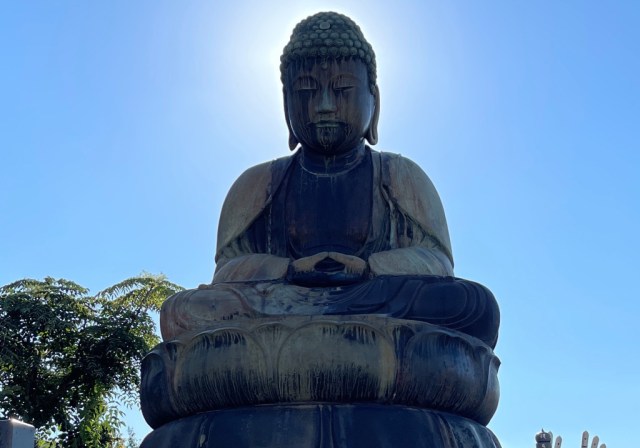
We’re not quite sure what to expect when we head out on a day trip from Tokyo to see the Great Buddha of Kamagaya.
Even if you don’t have a background in classical Japanese art, just about everyone can recognize the Great Buddha of Kamakura. Located in Kanagawa Prefecture, Tokyo’s neighbor to the south, the Great Buddha of Kamakura is 13.35 meters (43.8 feet) tall and one of the most famous symbols of Japan.
▼ Great Buddha of Kamakura
However, it’s not the only Great Buddha statue, or Daibutsu, to use the Japanese term, in Japan. For example, there’s a Great Buddha of Nara which attracts visitors to Todaiji Temple in Nara City. What a lot of people aren’t aware of, though, is that there’s also a Great Buddha in the town of Kamagaya, Chiba Prefecture, about an hour east of Tokyo.
But if it’s so close to the most populous city in Japan, why don’t more people know about the Great Buddha of Kamagaya? Probably because its claim to fame is a modest-sized one: the Kamagaya Daibutsu is the smallest Great Buddha in Japan.
Curious as to what this major/minor work of art looks like, we hopped on the train and took the Shin Keisei Line out to Kamagaya. The closest station to the statue is even called Kamagaya Daibutsu Station, and since the Great Buddha is said to be just a 30-second walk away, we figured we’d have no problem spotting it as soon as we stepped out of the ticket gate.
▼ Kamagaya-Daibutsu Station
Okay, Kamagaya Daibutsu, let’s take a look at you!
Umm…
Huh…
Looking around, we spotted a lot of the elements of a typical Japanese suburban cityscape, but no Great Buddha. We did at least see a sign designating this stretch of the road as the Kamagaya Daibutsu Bus Stop, though, and combined with the Kamagaya Daibutsu Station, there was no question that the statue should be nearby.
We looked around once more in confusion, and this time we noticed a cemetery across the street…and just barely peeking out from a sign, we say a shape that looked like the curly hair Buddha often has in statues.
…and it turned out this is where the Great Buddha of Kamagaya had been hiding!
OK, maybe “hiding” isn’t the right word. After all, the Kamagaya Daibutsu is sitting as out in the open as it can.
It’s just that even with the town’s modest level of development, the Great Buddha of Kamagaya is still dwarfed and concealed by the buildings and infrastructure around it. Granted, if you simply think of it as a statue, it’s not a tiny one. Including the pedestal, the Kamagaya Daibutsu is 2.4 meters (7.9 feet) tall. However, the Great Buddha itself is just 180 centimeters (70.9 inches) tall, only slightly more than average male height in Japan.
That’s not to say the statue is without its own special beauty, and having been commissioned by a local merchant in 1776, it’s got historical significance too. While it can’t match the awe-inspiring grandeur of its more famous Daibutsu brethren in Kamakura, Nara, and temples elsewhere in Japan, the statue has a kind, calm expression and a reassuring presence, in part because it’s simply not big enough to feel intimidating.
And undersized or not, the people of Kamagaya show big love for their Daibutsu, so we decided to get in the spirit and pick up a Daibutsu Croquette from a local vendor.
▼ The croquette, unsurprisingly, isn’t especially big.
The irony here is that there are plenty of Buddhist statues in Japan that are significantly larger than the Great Buddha of Kamagaya that don’t call themselves a Daibutsu. For that matter, there’s no official criteria on what does or doesn’t qualify a statue of Buddha for “Great” status. But maybe the lesson here is that any of us can be great in our own way as long as we choose to be.
Kamakura Daibutsu photo: Wikipedia/MGA73bot2
All other photos ©SoraNews24
● Want to hear about SoraNews24’s latest articles as soon as they’re published? Follow us on Facebook and Twitter!
[ Read in Japanese ]

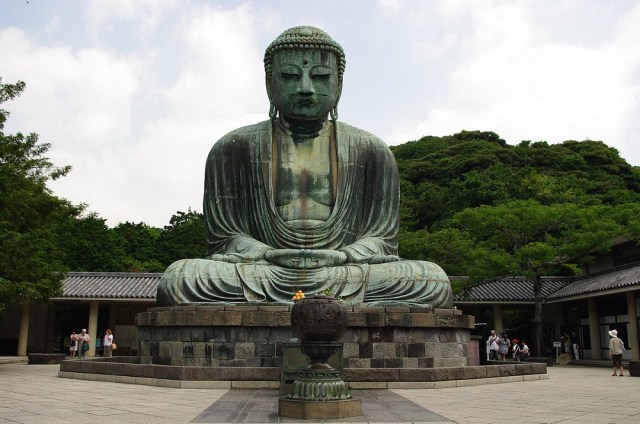
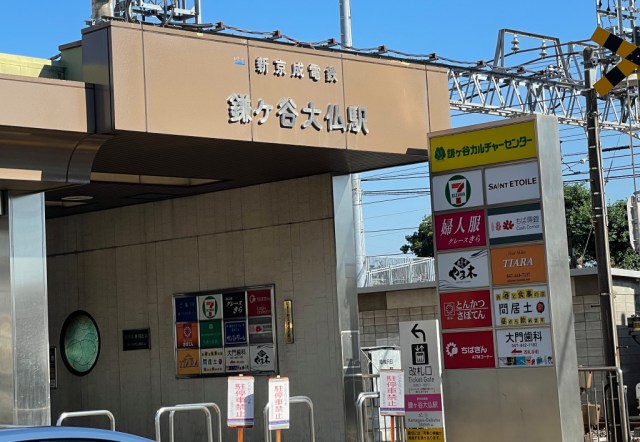
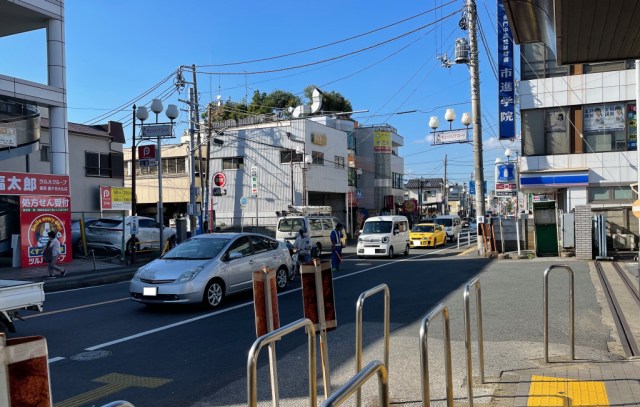
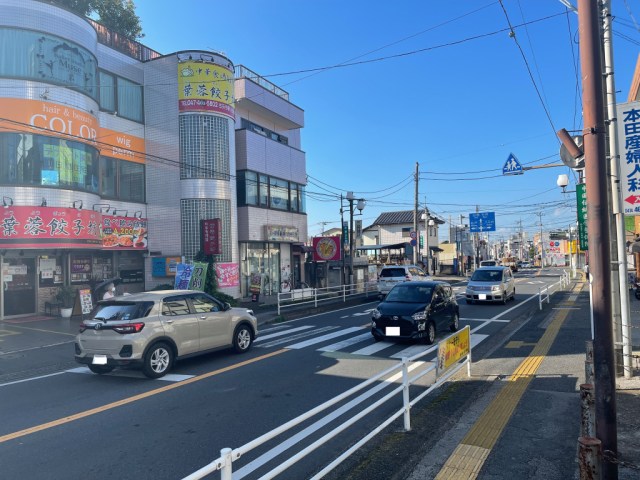
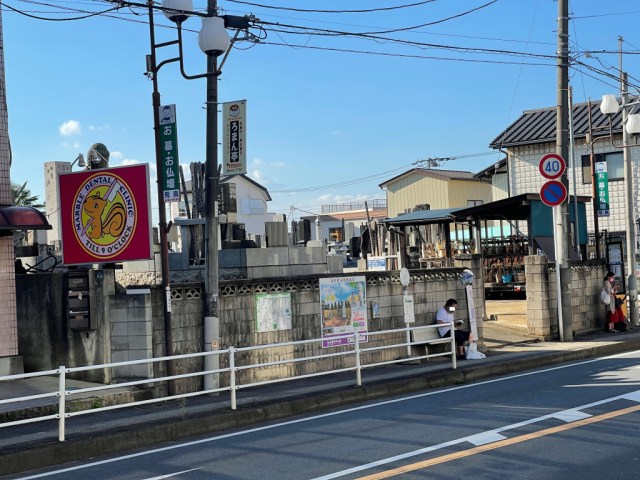
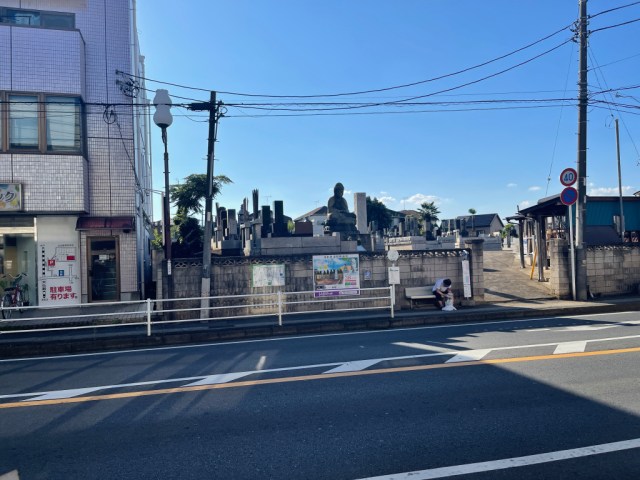
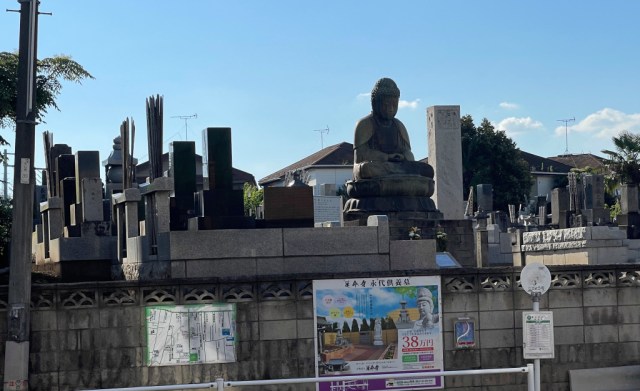

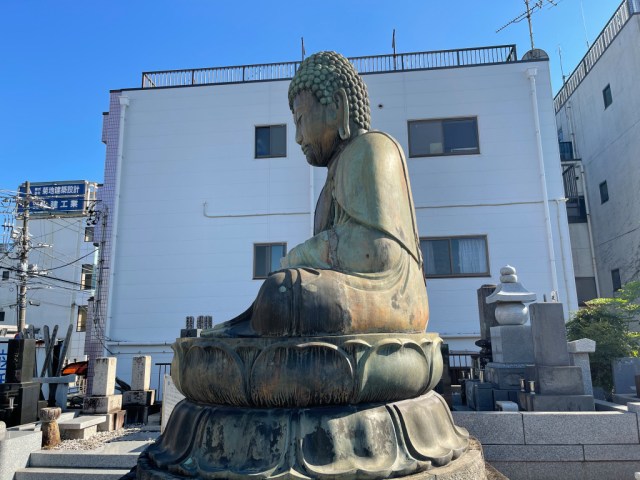
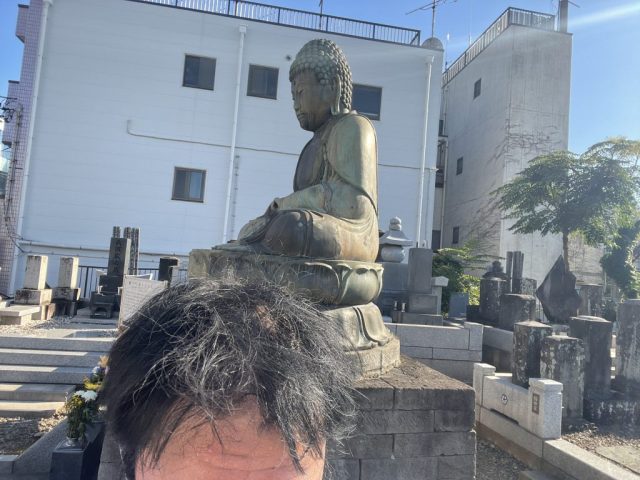

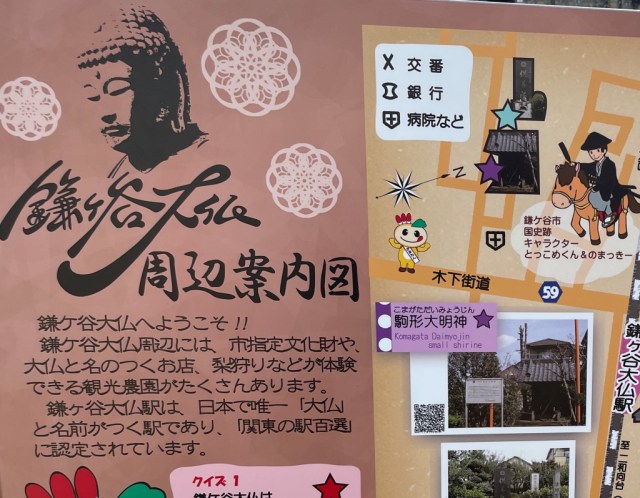
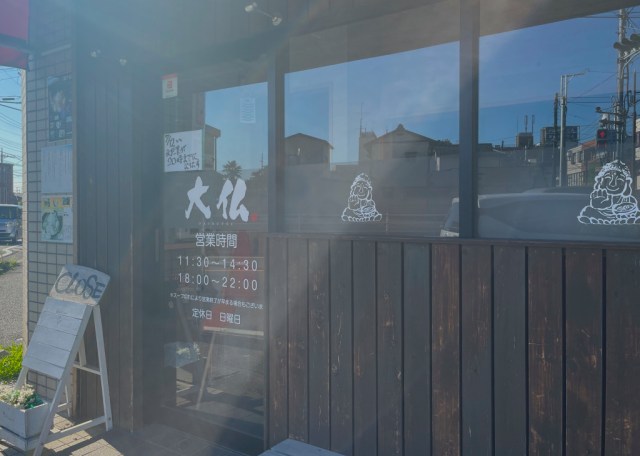
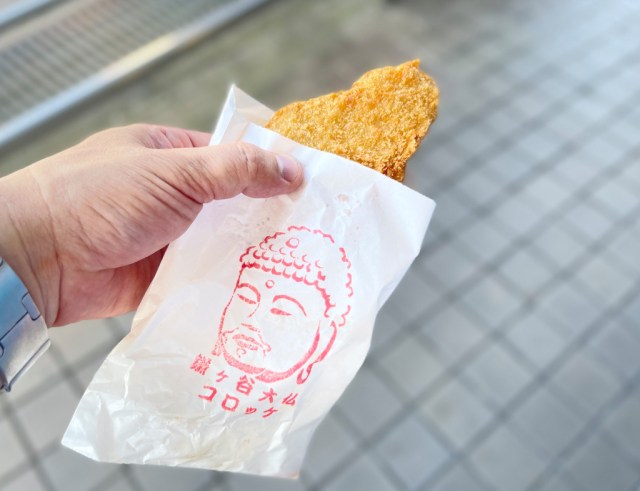
 Where to find the Great Floating Buddha of Ikebukuro
Where to find the Great Floating Buddha of Ikebukuro Buddha vs Eva, Ultraman, Gundam and Lady Liberty: How the otherworldly measure up
Buddha vs Eva, Ultraman, Gundam and Lady Liberty: How the otherworldly measure up Surreal scenes of Nara’s giant Buddha statue getting its once-a-year cleaning from 170 people【Video】
Surreal scenes of Nara’s giant Buddha statue getting its once-a-year cleaning from 170 people【Video】 This little-known temple in rural Japan has a giant Buddha bigger than Kamakura’s or Nara’s【Pics】
This little-known temple in rural Japan has a giant Buddha bigger than Kamakura’s or Nara’s【Pics】 Dragon reformation and the largest clay Budda in Japan: A visit to Okadera Temple【Photos】
Dragon reformation and the largest clay Budda in Japan: A visit to Okadera Temple【Photos】 Starbucks Japan unveils new sakura cherry blossom collection for hanami season 2026
Starbucks Japan unveils new sakura cherry blossom collection for hanami season 2026 Is Tokyo Station’s startlingly expensive wagyu bento boxed lunch worth its high price?[Taste test]
Is Tokyo Station’s startlingly expensive wagyu bento boxed lunch worth its high price?[Taste test] One Piece creator has hidden secret of anime treasure’s identity in chest at bottom of real-world ocean
One Piece creator has hidden secret of anime treasure’s identity in chest at bottom of real-world ocean Sakura Festival in Chiyoda mixes illuminations, boats, music, and Rilakkuma in the heart of Tokyo
Sakura Festival in Chiyoda mixes illuminations, boats, music, and Rilakkuma in the heart of Tokyo Starbucks Japan releases new sakura goods and drinkware for cherry blossom season 2026
Starbucks Japan releases new sakura goods and drinkware for cherry blossom season 2026 Live-action One Piece’s Luffy teaches Sesame Street’s Elmo a Japanese word for friendship[Video]
Live-action One Piece’s Luffy teaches Sesame Street’s Elmo a Japanese word for friendship[Video] Japanese company tackles plastic consumption by making tote bags out of discarded umbrellas
Japanese company tackles plastic consumption by making tote bags out of discarded umbrellas Looking for a job in Japan? New “Sugoi Kawaii” maid cafe in Akihabara now hiring foreigners!
Looking for a job in Japan? New “Sugoi Kawaii” maid cafe in Akihabara now hiring foreigners! Should you drive through a red traffic light like this in Japan? Confusing road rule explained
Should you drive through a red traffic light like this in Japan? Confusing road rule explained Starbucks releases a Kyoto Matcha Latte in Japan for a limited time
Starbucks releases a Kyoto Matcha Latte in Japan for a limited time Starbucks Japan releases first-ever Hinamatsuri Girls’ Day Frappuccino
Starbucks Japan releases first-ever Hinamatsuri Girls’ Day Frappuccino Japanese restaurant chain serves Dragon Ball donuts and Senzu Beans this spring
Japanese restaurant chain serves Dragon Ball donuts and Senzu Beans this spring Japan Extreme Budget Travel! A trip from Tokyo to Izumo for just 30,000 yen [Part 1]
Japan Extreme Budget Travel! A trip from Tokyo to Izumo for just 30,000 yen [Part 1] Highest Starbucks in Japan set to open this spring in the Tokyo sky
Highest Starbucks in Japan set to open this spring in the Tokyo sky Japan’s craziest burger chain takes menchi katsu to new extreme levels
Japan’s craziest burger chain takes menchi katsu to new extreme levels Japan Extreme Budget Travel! A trip from Tokyo to Izumo for just 30,000 yen [Part 2]
Japan Extreme Budget Travel! A trip from Tokyo to Izumo for just 30,000 yen [Part 2] Japan has only one airport named after a samurai, so let’s check out Kochi Ryoma【Photos】
Japan has only one airport named after a samurai, so let’s check out Kochi Ryoma【Photos】 Japanese drugstore sells onigiri at pre-stupid era prices, but how do they compare to 7-Eleven?
Japanese drugstore sells onigiri at pre-stupid era prices, but how do they compare to 7-Eleven? Viral Japanese cheesecake from Osaka has a lesser known rival called Aunt Wanda
Viral Japanese cheesecake from Osaka has a lesser known rival called Aunt Wanda Which convenience store onigiri rice balls are the most popular? Survey reveals surprising results
Which convenience store onigiri rice balls are the most popular? Survey reveals surprising results Japan’s newest Shinkansen has no seats…or passengers [Video]
Japan’s newest Shinkansen has no seats…or passengers [Video] Foreigners accounting for over 80 percent of off-course skiers needing rescue in Japan’s Hokkaido
Foreigners accounting for over 80 percent of off-course skiers needing rescue in Japan’s Hokkaido Super-salty pizza sends six kids to the hospital in Japan, linguistics blamed
Super-salty pizza sends six kids to the hospital in Japan, linguistics blamed Starbucks Japan unveils new sakura Frappuccino for cherry blossom season 2026
Starbucks Japan unveils new sakura Frappuccino for cherry blossom season 2026 Foreign tourists in Japan will get free Shinkansen tickets to promote regional tourism
Foreign tourists in Japan will get free Shinkansen tickets to promote regional tourism The 10 most annoying things foreign tourists do on Japanese trains, according to locals
The 10 most annoying things foreign tourists do on Japanese trains, according to locals Take a trip to Japan’s Dododo Land, the most irritating place on Earth
Take a trip to Japan’s Dododo Land, the most irritating place on Earth Naruto and Converse team up for new line of shinobi sneakers[Photos]
Naruto and Converse team up for new line of shinobi sneakers[Photos] Is China’s don’t-go-to-Japan warning affecting the lines at a popular Tokyo gyukatsu restaurant?
Is China’s don’t-go-to-Japan warning affecting the lines at a popular Tokyo gyukatsu restaurant? Survey asks foreign tourists what bothered them in Japan, more than half gave same answer
Survey asks foreign tourists what bothered them in Japan, more than half gave same answer Japan’s human washing machines will go on sale to general public, demos to be held in Tokyo
Japan’s human washing machines will go on sale to general public, demos to be held in Tokyo Starbucks Japan releases new drinkware and goods for Valentine’s Day
Starbucks Japan releases new drinkware and goods for Valentine’s Day We deeply regret going into this tunnel on our walk in the mountains of Japan
We deeply regret going into this tunnel on our walk in the mountains of Japan Studio Ghibli releases Kodama forest spirits from Princess Mononoke to light up your home
Studio Ghibli releases Kodama forest spirits from Princess Mononoke to light up your home Major Japanese hotel chain says reservations via overseas booking sites may not be valid
Major Japanese hotel chain says reservations via overseas booking sites may not be valid Put sesame oil in your coffee? Japanese maker says it’s the best way to start your day【Taste test】
Put sesame oil in your coffee? Japanese maker says it’s the best way to start your day【Taste test】 No more using real katana for tourism activities, Japan’s National Police Agency says
No more using real katana for tourism activities, Japan’s National Police Agency says We visit the Giant Buddha statue that our reporter dubs “kawaii” and “like a mascot character”
We visit the Giant Buddha statue that our reporter dubs “kawaii” and “like a mascot character” We visit “world’s largest” Buddha in Fukuoka, puts Sagat’s to shame
We visit “world’s largest” Buddha in Fukuoka, puts Sagat’s to shame This beautiful mountaintop Buddha carving in Japan is much newer than it looks【Photos】
This beautiful mountaintop Buddha carving in Japan is much newer than it looks【Photos】 A visit to the ordinarily forbidden hall of Nara’s Hasedera Temple【Photos】
A visit to the ordinarily forbidden hall of Nara’s Hasedera Temple【Photos】 We visit a mysterious pagoda near Yomiuri Land, turns out to be an incredibly sacred spot
We visit a mysterious pagoda near Yomiuri Land, turns out to be an incredibly sacred spot Enormous Buddhist Kannon statue in Sendai shocks visitors with otherworldly looming
Enormous Buddhist Kannon statue in Sendai shocks visitors with otherworldly looming Ancient temple with National Treasures is a hidden gem on the Nara Yamato Four-Temple Pilgrimage
Ancient temple with National Treasures is a hidden gem on the Nara Yamato Four-Temple Pilgrimage Japan’s famous Great Buddha of Kamakura, Shirakawa village grace beautiful new Coca-Cola bottles
Japan’s famous Great Buddha of Kamakura, Shirakawa village grace beautiful new Coca-Cola bottles 1,032 statues, and one thing too many people miss, at this Kyoto temple
1,032 statues, and one thing too many people miss, at this Kyoto temple Why is there a giant Buddha head on the top of this Japanese office building?【Photos】
Why is there a giant Buddha head on the top of this Japanese office building?【Photos】 55-foot tall statue of Buddhist goddess of mercy could be yours for just 10 bucks
55-foot tall statue of Buddhist goddess of mercy could be yours for just 10 bucks This amazing Buddhist statue cafe in Japan could be a museum all by itself【Photos】
This amazing Buddhist statue cafe in Japan could be a museum all by itself【Photos】 Gundam as god – Photo shows real-life giant anime robot getting deep respect
Gundam as god – Photo shows real-life giant anime robot getting deep respect Japan has only one airport named after a samurai, so let’s check out Kochi Ryoma【Photos】
Japan has only one airport named after a samurai, so let’s check out Kochi Ryoma【Photos】 Is China’s don’t-go-to-Japan warning affecting tourist crowd sizes in Nara?
Is China’s don’t-go-to-Japan warning affecting tourist crowd sizes in Nara?